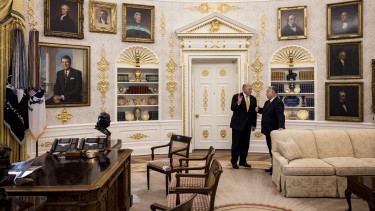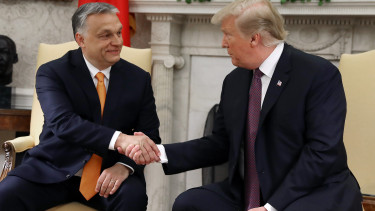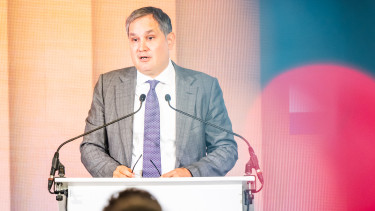US experts to Portfolio: Europe can breathe a sign of relief if Biden wins election

Republican President Donald Trump, who in foreign policy relies on realistic bilateral co-operations, has spoken explicitly against the European integration on multiple occasions and threatened raising tariffs on several products imported from the European Union. Joe Biden, however, remains a closed book in this respect for now therefore we asked analysts at three US think tanks what they expect Biden’s victory could bring about. The respondents were
- Corinne Krupp, Professor of the Practice in the Sanford School of Public Policy, Associate Dean for Academic Programs in the Sanford School of Public Policy
- Hajnalka Vincze - Senior Fellow in the Center for the Study of America and the West at the Foreign Policy Research Institute
- Charles A. Kupchan, senior fellow at the Council on Foreign Relations (CFR) and professor of international affairs at Georgetown University in the Walsh School of Foreign Service and Department of Government.
During the term of President Trump, there has been a threat of rising tariffs on EU products, and quite often, we experienced an unfriendly approach to the European integration. What can we expect from Mr. Biden? Is there a chance that the EU-US relations head back on the path of traditional collaboration as we saw during the presidency of Barack Obama?
Corinne Krupp: Yes, I believe that if Biden is elected President, he will take a more collaborative approach on trade and foreign policy than President Trump. He has indicated that he will seek to remove tariffs on US allies (like the EU), and try to work together to devise a strategy for countering China’s power by leveraging a group approach, rather than going it alone like the US has with President Trump. Traditionally, the Democratic party has been more protectionist than the Republican party, but President Trump has used tariffs more than any other President since the 1930s. I expect a Biden administration to tack back towards a more moderate, more open trade stance compared to the past 4 years.
Hajnalka Vincze: If Biden wins, we’ll hear a huge sigh of relief in Europe and the US will emphasise the importance of alliances. At the same time, Washington will present extremely tough expectations, albeit in a more amicable tone. Being grateful for not having to sit across Trump, Europeans will need to make even more concessions than before, adjusting their policies towards Russia and China to the United States, rethinking their energy supply along the lines of Washington’s recommendations, and further strengthening the USA-led NATO. One of the upcoming litmus tests will come up in the defence industry. The US will want to have a share in the projects financed by the EU, under its own terms. The question is whether Biden will be able to achieve behind the curtains while taking a soft line what Trump was unable to get even by open coercion and threats.
Charles A. Kupchan: Biden is a committed Atlanticist who understands that cooperation between the United States and Europe remains of vital importance to both parties. He also appreciates the role that the EU has played in advancing peace and prosperity in Europe; unlike Trump, who has been a detractor of the project of European integration, Biden would be an avid supporter. The United States and Europe would have plenty of hard work ahead of them, but they would again be on the same team.
During the Obama administration, there have been talks about a potential free trade agreement between the two sides. In your opinion, is it possible that these talks could continue in case of a Biden win?
Corinne Krupp: The Trans-Atlantic Trade and Investment Partnership negotiations between the US and EU began in 2013, during the Obama Administration, but President Trump did not continue them during his presidency, and they were declared “obsolete and no longer relevant” by the European Commission on 15 April 2019. I doubt there will be a renewal of these negotiations with a Biden presidency since there seems to be a lack of political will in the US to pursue mega-regional trade and investment agreements. There are still many sectors of the US that are recovering from the China shock in the 2000s, and free trade is often blamed for many job losses, plant closures, and increases in structural inequality, whether trade is actually the cause of these ills or not. Given that the US and the EU will be focused on recovering from pandemic and its economic effects, I doubt there will be a big push to reopen these trade negotiations.
Hajnalka Vincze: Even the Obama administration attempted to bring back the Trans-Atlantic free trade talks from the dead, but to no avail. On the US side, the “guardians” of the economy, the independent regulatory authorities created barriers, and on the European side the talks were blocked by an increasingly dissatisfied general public and an occasionally squabbling France. In case of Biden win they would need to have something to show for; a sign of a big Trans-Atlantic reconciliation. But the so-called non-tariff barriers that are currently in the crosshairs are a much tougher nut to crack than a few percentages of tariffs here or there. Regulations and standards are in conflict here, and through these they would often need to harmonise different approaches and values.
Charles A. Kupchan: I would not expect an early push on a U.S.-EU free trade agreement. Governments on both sides of the Atlantic will have their hands full managing the pandemic and getting their wounded economies back to full speed. It's hard to see a trade deal emerging as a priority.
While the Western EU member states experienced a deterioration of US relations, the connection between the Eastern part of the bloc and the US government has obviously improved. What role does the CEE region play in the plans of the Democratic Party?
Corinne Krupp: As a candidate, Biden has asserted that he will reverse the “America First” thrust of President Trump’s actions to withdraw the US from many international organizations (e.g., the WHO, blocking appointments to the WTO’s Appellate Body, Paris Accords, etc.), and return the US to more engagement with international institutions. He is particularly focused on climate change policies and checking China’s growing economic and political power, as well as restoring respect for the US and its leadership. I have not seen any particular remarks by Biden about the EU or the CEE region, but I believe his policies will be more closely aligned with the Obama administration on foreign policy, trade, and climate policy.
Hajnalka Vincze: In terms of words a Biden administartion would be less tolerant and would expect more in terms of adhering to democratic/liberal principals. But in practice the American behaviour will depends a lot more on what stance these countries will take on strategic issues that are key for the US: marginalising Russia, having NATO behind their back against China, ensuring the largest possible US influence and say in European matters. Whoever is in the White House, if Central and Eastern European countries prove to be reliable partners in this issues, their internal affairs will be only a blip on Washington’s radar.
Charles A. Kupchan: The Democratic Party has been a strong backer of advancing security and prosperity in the region. It was during the Obama-Biden administration that Washington led efforts to increase defense spending within NATO and to bolster NATO's eastern flank, including through new deployments to the region. A Biden administration would continue strong relations with the CEE region -- but would also repair ties with countries like Germany and France that have suffered during Trump's presidency. And Biden would also be a strong supporter of Ukraine, as he was while serving as vice president.
Cover photo: Getty Images







